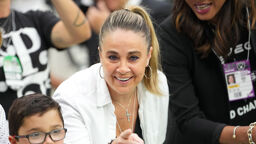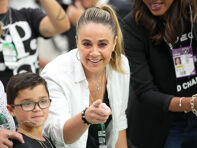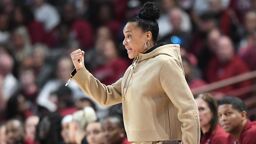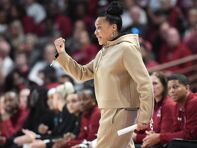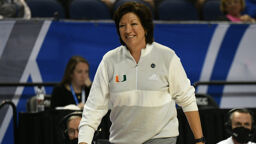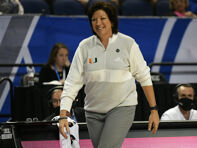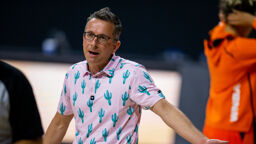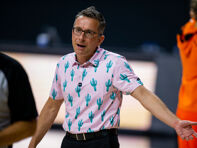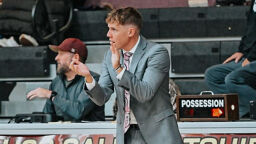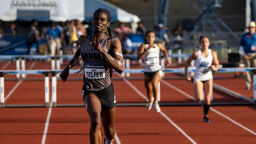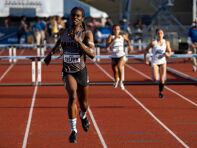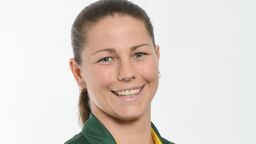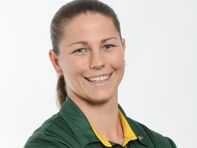SAN ANTONIO — Shawn McLaughlin came out as gay his freshman year of college, and he felt embraced as a college men’s volleyball player by his teammates.
But then he became a college volleyball coach.
“[It’s harder] as a coach, definitely as a coach,” McLaughlin said. “As a coach, there are some land mines.”
At his first coaching job, the head coach told him that it’d be better for his career to keep his sexuality to himself.
His second job, he felt he was let go after a year for “questionable” reasons. He said he has no proof that it was because he is gay, but he emphasized it was “questionable.”
So in 2013 when he became assistant women’s volleyball coach at University of the Incarnate Word, a Division I university in San Antonio, he didn’t tell anyone he worked with about his sexuality during the first year.
“[I was] figuring out if I fit there and figuring out if the university would accept it,” McLaughlin said. “You are working at a religious institution, and religion, for whatever reason, has created a discrimination against people. … I just need to be aware that [discrimination] is a real possibility and just kind of keep my eyes and ears open and don’t necessarily put yourself out there yet.”
A few months into the job, he learned that head women’s volleyball coach, Jennifer Montoya, has a gay brother. McLaughlin started paying close attention to how she talked about her brother.
During his second season, he and Montoya were talking on a road trip when he finally broached the topic of his sexuality.
“It’s just another detail about him,” Montoya said of her reaction to McLaughlin being gay. “It’s totally fine.”
“She told me I was stupid for waiting a year and a half,” McLaughlin said of Montoya’s reaction.
After Montoya’s acceptance, he started talking about his sexuality with the club volleyball team he coaches. Last season, he felt willing to discuss it with the Incarnate Word players for the first time.
McLaughlin, now starting his fifth year at Incarnate Word, has seen college volleyball coaching become more accepting of LGBT coaches in the last five to 10 years. He’s been able to live openly the past year at UIW and wants to help make the sport more open to everyone by talking about his experience.
He does not know how his story will be received at Incarnate Word, a Catholic institution, but he feels it is important to share anyway.
“There are still nuns, who live on campus,” McLaughlin said. “I don’t see them or deal with them on a daily basis. I don’t openly tell them or walk around with a sign on my forehead, so I don’t know how they would respond. I know how my boss responded and how my [athletics director] responded, but I don’t know how the rest of it will respond.”

Out on the court
Shawn McLaughlin played college volleyball at Lindenwood University in suburban St. Louis, and his freshman year, the team reached the 2005 NAIA Championships.
Those championships were Danny McLaughlin’s first time seeing his son play in college. Shawn had grown up in South Lake Tahoe, California, and he was now going to a religious university in St. Charles, Missouri, so his parents felt concerned about the acceptance of their gay son. By the end of the championships, Danny realized Shawn fit in great.
“Not one of them cared,” Danny said.
That specifically showed in the national semifinal. With Lindenwood down about five points, Shawn McLaughlin went to serve. As Shawn remembers it, he got three straight aces, and the opponent called timeout. Before the Lindenwood team went back on the court, an upperclassman pulled the guys together and said jokingly, “They can’t keep a flamer down.”
McLaughlin resumed serving and scored about five more points to give Lindenwood a comfortable lead. His team won the match and finished second in the country that year.
“To me, it was a relief, because I knew that he found his niche,” Danny McLaughlin said. “He found a situation that he could be himself.”
Shawn McLaughlin said he felt acceptance from his Lindenwood teammates from the moment he shared he’s gay as a freshman. Throughout his college career, straight teammates regularly went with him to gay bars in the St. Louis area.
“The team was very supportive,” McLaughlin said. “The same way they would tease each other about who they dated, they teased me about who I dated.”
McLaughlin helped Lindenwood finish second again at the 2006 NAIA Championships. The team also reached the 2007 and 2008 NAIA Championships.
In 2009, McLaughlin graduated from Lindenwood, and that year, he got his first college coaching job at the University of California, Davis. McLaughlin enjoyed the experience, but the UC Davis coach discouraged him from being openly gay.
“I was told when I first started off that the coaching world is very homophobic and superficial, and so you have to be careful identifying yourself in it,” McLaughlin said. “She told me that you can’t be gay and in this profession.”
Kevin Blue, UC Davis athletics director since 2016, said in response to McLaughlin’s experience, “The former employee’s reported statement is at odds with what our university believes and how it currently acts. Coaches who identify as part of the LGBTQ community are positive role models for our students.”
McLaughlin spent two years at UC Davis and left on good terms.
“I don’t have any kind of animosity towards her,” McLaughlin said. “I don’t thank her, but it is what it is. She wasn’t trying to do anything, necessarily, harmful. She was right, there were a lot of issues. … About five or six years ago, there were some questionable fires being made.”
McLaughlin feels he was one of them. His next coaching job was at Nevada, and that lasted one season.
“The head coach fired me,” McLaughlin said. “I could ride out my contract [which went to June] if I resigned. But I was not welcome back when my contract was up.”
He feels being gay contributed to losing the job.
“I definitely think that played a part in it,” McLaughlin said.
Chad Hartley, Nevada associate athletics director for communications, said in response to McLaughlin’s experience, “First and foremost, the University has an anti-discrimination policy and supports diversity in all forms.” Hartley said Nevada’s records show McLaughlin resigned in June 2012.
The former UC Davis and Nevada head coaches both seem to no longer be coaching college volleyball, based on an online search. They are not being named since they could not be reached for comment.
After Nevada, McLaughlin took a job at the University of Denver, where he spent a year. In 2013, he got the job at Incarnate Word. At that point, he’d seen his sexuality and profession didn’t mix. He headed to San Antonio prepared to keep them separate.
“When I realized that kind of stuff exists, I got a little tougher, and I blocked most of it and just moved on,” McLaughlin said before reflecting with hindsight. “That’s maybe not the best way to handle it.”

Importance of openness
Two years ago at an Incarnate Word women’s basketball game, one of McLaughlin’s women’s volleyball players came and sat next to him.
She had news to share. She was dating someone.
When McLaughlin asked who, she pointed to a player on the court.
“She had dated boys before, so I wasn’t really expecting the comment,” McLaughlin said. “It was a cool moment.”
That was the first time McLaughlin had a player come out to him as LGBT.
Having one of his players show she was comfortable revealing that she is LGBT helped propel McLaughlin to be open about his sexuality with his players.
“I’ve come to realize that if I’m going to be a really good coach that I have to be the best version of myself,” McLaughlin said. “The best version of myself is being a homosexual.”
McLaughlin feels a stronger connection with his players by being open with them, and Montoya agrees. She sees McLaughlin being out to the players as an asset to the program.
“College is an interesting time of people’s lives,” Montoya said. “You’re getting off the leash from mom and dad a little bit more — having to figure out who you are and become more independent. … It can be hard for some people to have that much freedom or to not have anyone to feel like they can confide in. I feel like it’s been great for us.”
McLaughlin does feel the decision to be openly gay comes with land mines during college recruiting.
“If I’m recruiting a kid who comes from a very religious family, … I have to be a little bit cognizant of that,” McLaughlin said. “Parents tend to be a little bit more wary than the kids do. You have to just be aware that is a real discrimination that we have to deal with, if that makes sense. It shouldn’t be that way. I don’t really like it, but it is.”
No player or family has said they wouldn’t play for McLaughlin because he is gay. Most players tend to stop talking to a coach without giving a reason when they are no longer interested.
Regardless of the recruiting impact, McLaughlin feels obligated to set an example for his current players, and he feels the best example he can display is being authentic.
“When you are a coach or in a position of power, you’re a role model for kids,” McLaughlin said. “The most important thing in my job is to be a good person and a good role model to help them develop into the good people that they have the opportunity to become.”
You can follow Shawn McLaughlin on Instagram @shawndaniel3. He can also be reached by email at [email protected] or on Facebook.
Erik Hall is a member of the Associated Press Sports Editors and the National Lesbian and Gay Journalists Association. He can be reached on Facebook, Twitter @HallErik, or by email at [email protected]



